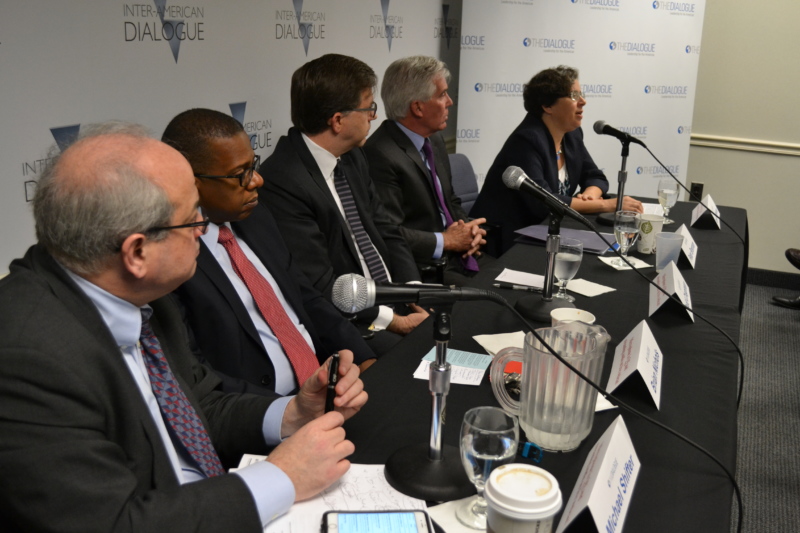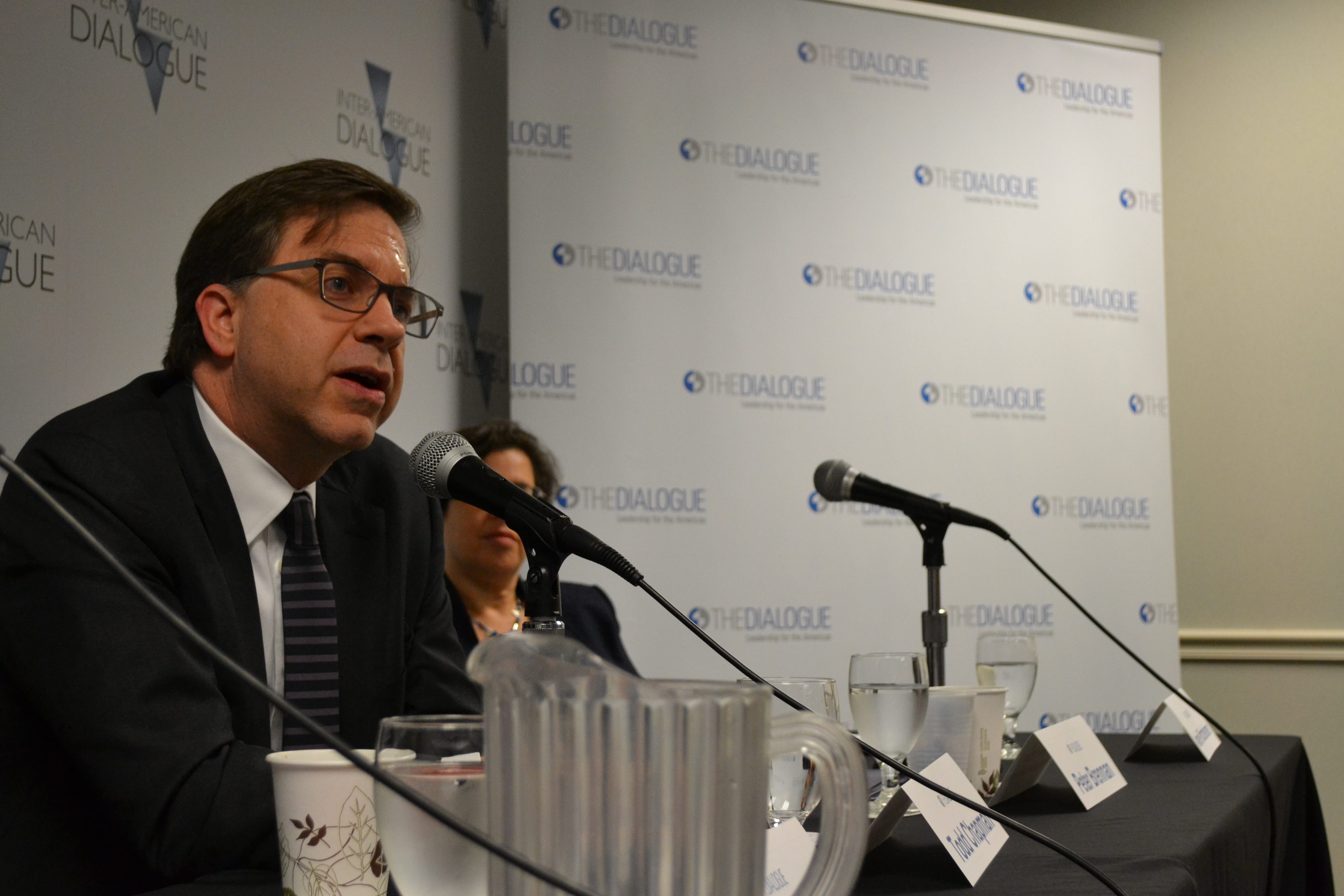US Outlook on the Andean Region
 Ben Raderstorf / Inter-American Dialogue
Ben Raderstorf / Inter-American Dialogue
In early 2016, the countries of the Andean region find themselves at important moments of transition and change. In Peru, the first round of the presidential elections in April will begin to define the country’s next political era. In Ecuador, President Rafael Correa has recently announced he will not attempt to run again when his current term expires. In Bolivia, the government of President Evo Morales just lost a tight referendum to abolish term limits, making it likely that he too will leave office. And in Venezuela, divided government between President Nicolás Maduro and the opposition-controlled National Assembly continues to be defined by deep tensions and political gridlock, with a backdrop of profound economic and political crisis and few signs that the many challenges will be resolved any time soon.
In this context, the Dialogue hosted experts from the State Department to discuss the US outlook on these four countries. Brian Nichols is the US Ambassador to Peru, Todd Chapman is the US Ambassador to Ecuador, Peter Brennan is the Chargé d’Affaires of the US Embassy in Bolivia, and Annie Pforzheimer is the Director of Andean Affairs at the US Department of State. The panel was moderated by Michael Shifter, President of the Inter-American Dialogue.
[caption id="attachment_48128" align="alignleft" width="384"] Photo by Ben Raderstorf / Inter-American Dialogue[/caption]
Photo by Ben Raderstorf / Inter-American Dialogue[/caption]Peru, according to Ambassador Nichols, is at a relatively positive moment, both when compared to the rest of the region and to its own history. With numerous important international meetings—including the COP 20 summit in 2014, the World Bank/IMF annual meetings in 2015, and the APEC meeting in 2016—the country is emerging as an important diplomatic voice in the region and worldwide. While the economy has grown slower than in previous years, it continues to be one of the most prosperous economies in Latin America. Ambassador Nichols also stressed Peru’s environmental leadership, noting that “Peru has created one of the world’s largest Amazon national parks,” a sign of commitment to environmental issues. Finally, in the context of the current presidential race, he noted how these elections mark, “the longest period of democratic governance in Peru’s history.” While many are disappointed by the electoral commission’s decision to invalidate the candidacies of Julio Guzmán and Cesar Acuña, he claimed that the decision was a reflection of Peru’s electoral laws—provisions that the commission had asked the Congress to change in the past but nothing was done. In closing, Ambassador Nichols remarked that he is “fully confident that Peru will have a free, fair, and transparent election, and that the result will reflect the will of the Peruvian voters.”
CDA Peter Brennan discusses term limit referendum in Bolivia #DialogueCOM pic.twitter.com/brWcuWXXUh
— The Dialogue (@The_Dialogue) March 16, 2016
In Ecuador, the discussion focused primarily on the dynamic year ahead for Ecuador, as well as the more complicated relationship between the US Embassy and the government. Ambassador Chapman emphasized the importance of coming political changes in the year ahead: specifically a new presidential election in 2017 that he posits will welcome a more open debate on the country’s economic model. He stated that the main challenge for the opposition is the lack of “national networks,” as most of its support is localized and limited. In terms of the economy, Ambassador Chapman discussed the estimated 2% contraction that the Ecuadoran economy will face this year as well as a sharp decline in FDI, evidence of the economic challenges the country faces. These, he noted, "will help define the political outcome of next year.” Ambassador Chapman concluded by adding optimistically that there is an interest from ministers in improving the US relationship, a trend which would benefit both countries, particularly in student exchanges, immigration flows, and tourism.
Similarly, in Bolivia economic challenges will also help define the political landscape, according to Ambassador Brennan. He discussed how President Morales and his administration are having to deal with unexpected losses caused by declining revenues from low commodity prices, a regional shift away from the left and “public aversion” to lifting presidential term limits. Amidst these changes, Ambassador Brennan noted that there is in Bolivia a “general spirit of opportunity” such as diversifying the economy and refocusing on agriculture. He also mentioned how important the efforts carried out in the country to improve bilateral relations are—claiming “dialogue is the way forward in this hemisphere" and pointing to the opening in Cuba. Some of these efforts are working groups established for the areas of commerce, trade, investment, the environment, health, education, rule of law and more. While acknowledging some fiery comments made by the Bolivian administration, he noted that President Morales is personally interested in improving relations. Ambassador Brennan’s closing remarks expressed concern over a politically influenced judiciary and the persecution of “independent watchdog entities.”
"It seems to be @NicolasMaduro's strategy to not engage" with congress -Pforzheimer #DialogueCOM pic.twitter.com/Xgho1JIvmJ
— The Dialogue (@The_Dialogue) March 16, 2016
Pforzheimer briefly discussed the complexity of Venezuela’s situation, arguing that the country is experiencing political and economic crises at the same time. She discussed both the Maduro and the legislature’s strategies: the former’s being no engagement with the latter and the divided opposition’s plan being to oust Maduro either through a referendum or through a change in the constitution. While noting the importance of public opinion as a political force, she highlighted the many challenges that have prompted public opinion to shift and become stronger such as challenges in health and security. She noted how this year the reaction to President Obama’s sanctions has differed greatly from last year, citing regional trends. Pforzheimer, however, insisted that chavismo continues to be a “strong political current.” She concluded by noting common themes in the Andes today, including over-dependence on commodities, questions of democratic governance, and salience of global transnational issues (like organized crime and the environment).
During the round of questions, participants asked about the implications for the Brazilian investigations in Peru, whether the Pacific Alliance would ask one of these four nations to join, the relevance of ALBA, Washington’s general attitude towards Bolivia, and Ecuador’s willingness to engage with the IMF. Michael Shifter also asked about the implications of the Colombian peace agreement for these Andean countries.



















